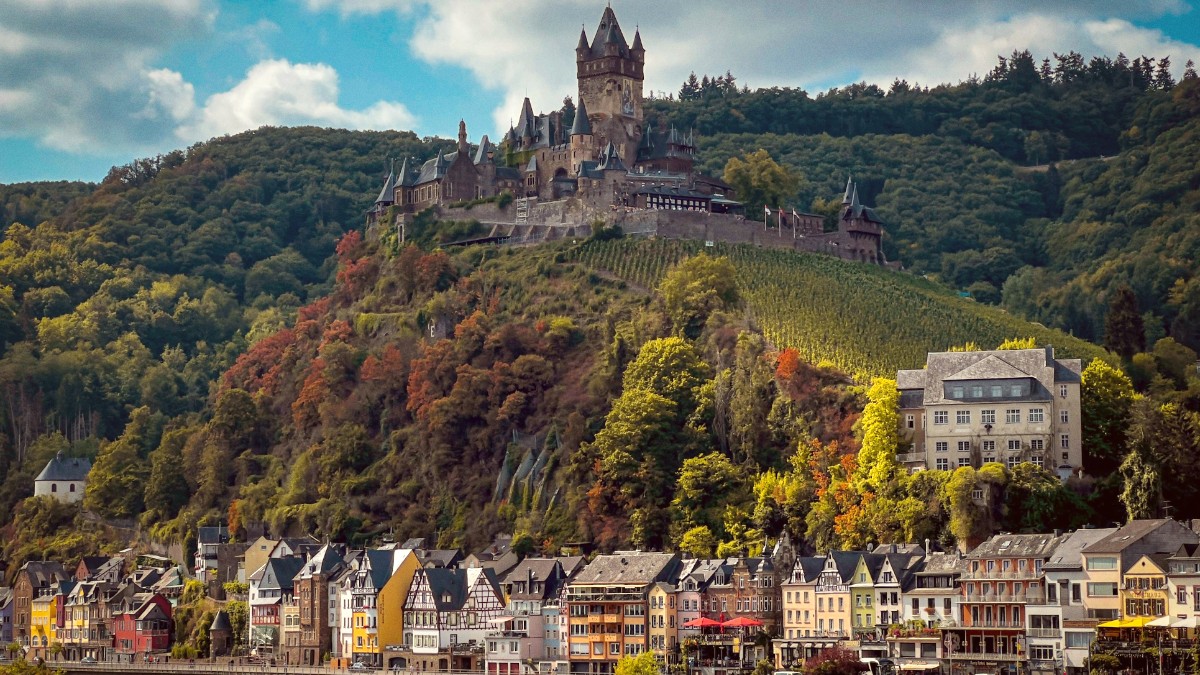
Rhineland Palatinate, Germany
The dramatic landscapes of the Rhine Valley suit a range of outdoor pursuits, from gentle strolls to challenging hikes.
This long-distance trail, spanning approximately 320 kilometers (200 miles), runs along the right bank of the Rhine, from Wiesbaden to Bonn. It is well-marked and features challenging sections with steep climbs and descents through forests and vineyards, with spectacular views of castles and the river.
This trail covers about 200 kilometers (124 miles) on the left bank of the Rhine, from Bingen to Remagen. It also presents challenging sections and connects numerous castles, permitting hikers to explore history on foot.
Many towns present shorter, well-marked circular trails. These vary in difficulty from easy riverside walks suitable for all ages to moderate vineyard hikes with some elevation gain, such as walks around the Loreley Rock or the Boppard Hamm. A Rhine Valley hiking map is helpful.
Swimming in the Rhine River is generally not safe due to strong currents and heavy commercial boat traffic. Utilize designated swimming lakes or public pools instead for water recreation.
The Rhine Valley offers immersive cultural experiences, deepening your appreciation for the region's traditions.
This spectacular annual series of firework displays occurs at various locations along the Rhine from May to September. Accompanied by boat parades, these events illuminate the castles and river with dazzling pyrotechnics, creating a magical atmosphere.
Countless wine festivals occur from spring to autumn throughout the wine regions. These events celebrate the grape harvest and local wines, featuring live music, traditional food stalls, and tasting opportunities.
In December, Christmas markets transform towns into festive hubs. They feature Glühwein (mulled wine), Lebkuchen (gingerbread), and various local snacks and traditional crafts.
Local winemakers often invite visitors for tastings directly at their vineyards. They share their passion for wine, discuss family history, and give insights into viticulture in the Rhine Valley. This fosters a genuine community experience.
While not a main focus for short-term visitors, some language schools in larger cities like Mainz or Koblenz present short-term German courses or introductory workshops for those interested in learning basic phrases.
At castles (like Marksburg), these festivals bring history to life with reenactments, crafts, and period entertainment. They represent a significant cultural celebration, especially during autumn. Check calendars for specific dates.
The Rhine Valley welcomes opportunities for relaxation and rejuvenation, from traditional spa towns to serene natural settings.
Near Koblenz, Bad Ems is a historic spa town renowned for its mineral springs. It has a long tradition as a health resort, presenting various natural therapy options.
Some health resorts (Kurorte) in the region, especially those with a history as spa towns, may focus on traditional healing practices, often involving mineral waters or specific local therapies.
Specific yoga and meditation retreats are limited in the immediate Rhine Valley. However, some hotels or wellness centers may present individual classes or occasional workshops.
Most towns have public outdoor swimming pools that open during the summer months, a refreshing way to cool off.
Smaller swimming lakes (Badeseen) in the surrounding region present natural swimming opportunities for a pleasant dip.
Gentle strolls along the Rhine riverbanks present peaceful relaxation and scenic views, ideal for unwinding after a day of sightseeing.
The Rhine Valley has a range of entertainment and nightlife options, from cozy traditional taverns to lively city bars.
This famous lane is a hub of activity with numerous wine taverns and pubs. It buzzes with energy, especially in the evenings, making it a natural spot for a self-guided pub crawl with music and dancing.
Nightclubs and dedicated dancing venues are mainly found in larger cities like Mainz and Koblenz. Their city centers present a good selection of bars, pubs, and lounges, catering to various tastes.
Pubs and bars in larger towns and tourist centers typically remain open later on weekends. In smaller villages, evening life tends to be quieter. Always check closing times.
Rüdesheim's Drosselgasse is a natural spot for a self-guided pub crawl. The city centers of Mainz and Koblenz also have bar scenes, presenting a range of venues for different tastes.
Beyond regular venues, look for special evening events tied to festivals, wine celebrations, or local cultural programming for unique social experiences. Many towns host outdoor concerts during summer.
Smaller villages offer a quieter, more tranquil evening ambiance, ideal for relaxing walks or intimate dinners. Larger towns balance peaceful residential areas with bustling city centers and nightlife zones.
Tipping culture in bars is similar to restaurants; rounding up or adding 5-10% for good service is common.
Shopping in the Rhine Valley presents opportunities to find local specialties, artisan crafts, and memorable souvenirs.
Look for local craft shops in smaller towns and villages. These frequently sell pottery, woodwork, textiles, and other handmade items crafted by local artisans.
Many towns along the Rhine, like Bacharach or Boppard, feature various local art galleries and exhibition spaces, demonstrating the work of regional artists.
The Rhine Valley presents diverse shopping, from lively markets to artisan crafts. Look for local wine, traditional pottery, and unique souvenirs to remember your trip. Remember to support local producers and businesses.